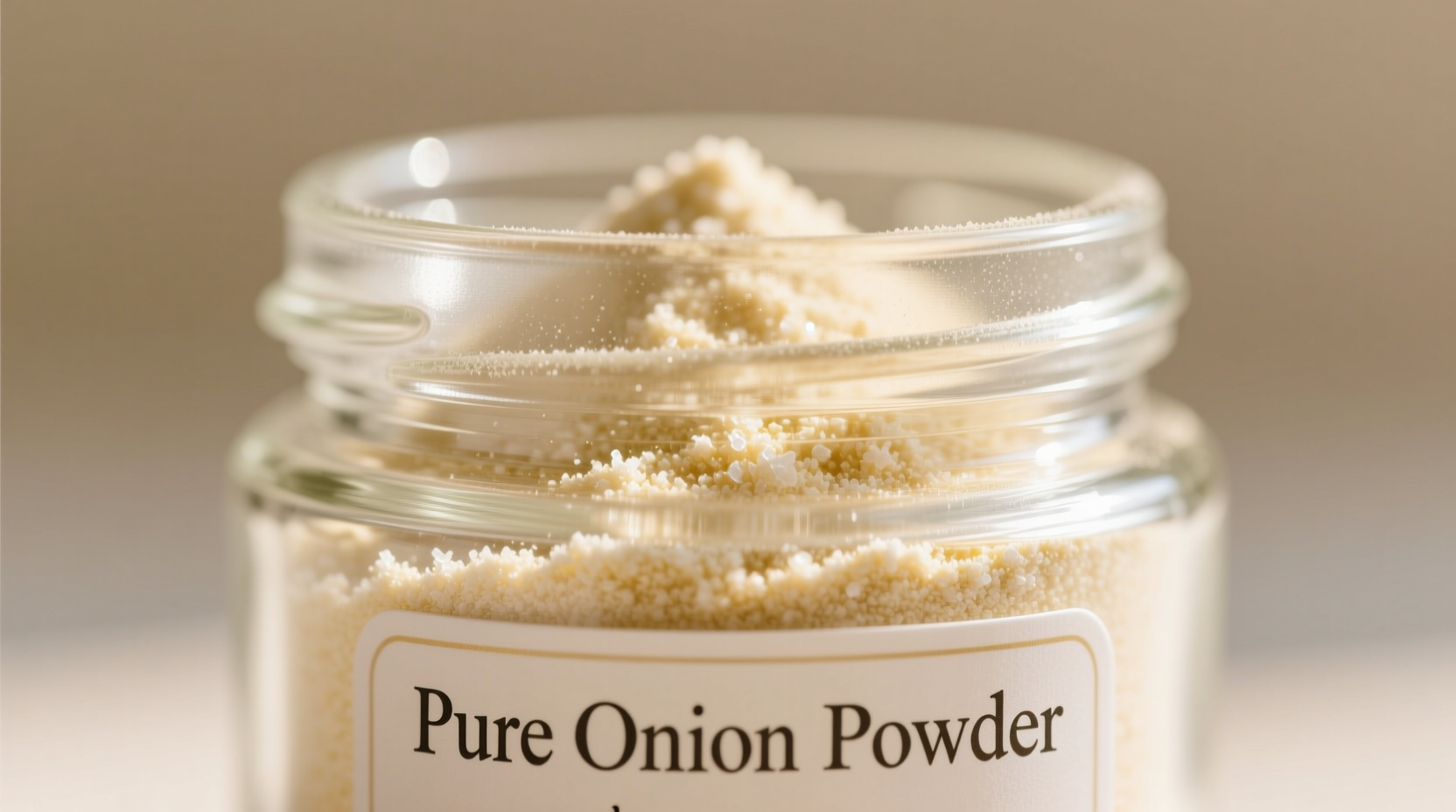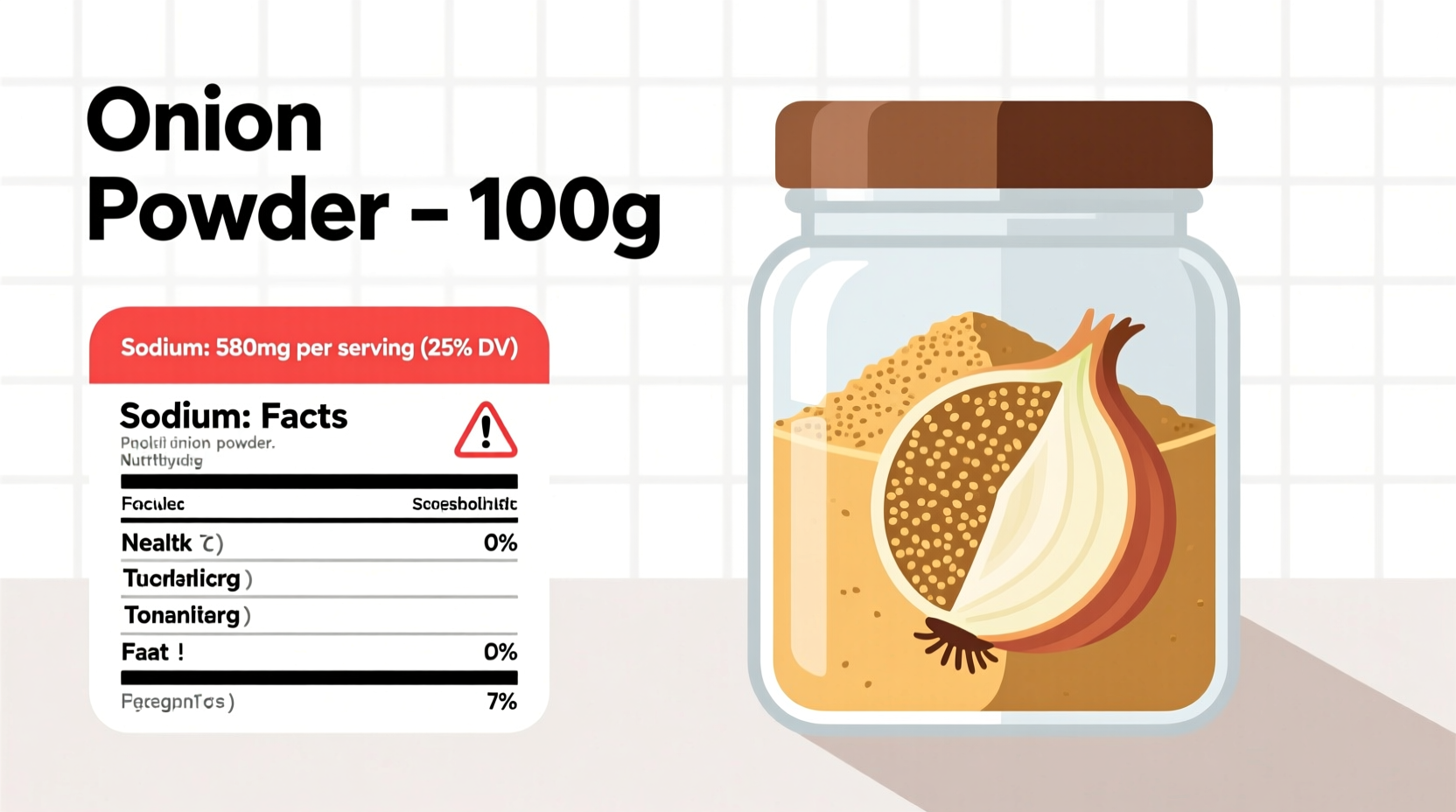Understanding Onion Powder and Sodium Content
When you're watching your sodium intake for health reasons, even seemingly innocent ingredients like onion powder deserve scrutiny. The answer to "does onion powder have sodium" isn't as straightforward as you might think—it depends entirely on whether you're using pure onion powder or a commercial product with additives.
Pure Onion Powder: The Natural State
Dehydrated onion powder made from 100% onions contains only trace amounts of naturally occurring sodium. According to USDA FoodData Central, one tablespoon (7g) of pure onion powder contains approximately 5 milligrams of sodium—a negligible amount that won't impact even the strictest low-sodium diets.
This minimal sodium occurs naturally in onions themselves. When dehydrated and ground into powder, the sodium concentration remains extremely low because no additional ingredients are introduced during processing.

Commercial Products: Where Sodium Becomes a Concern
Here's where confusion arises: many store-bought onion powders contain added salt. Manufacturers frequently include sodium as an anti-caking agent to prevent clumping, or as part of flavor-enhancing blends. This practice transforms what would be a virtually sodium-free ingredient into one that could significantly impact your daily intake.
| Product Type | Serving Size | Sodium Content | Percentage of Daily Value |
|---|---|---|---|
| Pure onion powder (USDA data) | 1 tbsp (7g) | 5mg | <1% |
| Generic brand with salt added | 1 tsp (1.8g) | 95mg | 4% |
| Seasoned onion powder blend | 1 tsp (2g) | 290mg | 13% |
| Low-sodium commercial option | 1 tbsp (6g) | 10mg | <1% |
This comparison clearly shows how dramatically sodium content can vary between products. The seasoned blend contains nearly 60 times more sodium than pure onion powder for a similar serving size.
Reading Labels: Your Best Defense
When shopping for onion powder with minimal sodium, follow these practical steps:
- Check the ingredient list first - Pure onion powder should list only "onions" or "dehydrated onions." If you see "salt" anywhere in the ingredients, keep looking.
- Examine the nutrition facts panel - Compare sodium content per serving across brands. Look for products with less than 50mg sodium per tablespoon.
- Beware of "seasoned" or "flavored" varieties - These almost always contain added sodium along with other seasonings.
- Consider store brands vs. specialty brands - Generic grocery store brands are more likely to contain added salt than specialty spice brands that cater to health-conscious consumers.
Health Implications for Sodium-Sensitive Individuals
For people managing hypertension, heart disease, or kidney conditions, even small amounts of added sodium matter. The American Heart Association recommends no more than 2,300mg of sodium daily—ideally moving toward an optimal limit of 1,500mg for most adults.
Using seasoned onion powder regularly could add hundreds of milligrams of sodium to your daily intake without you realizing it. Over the course of a week, this seemingly minor addition could account for 10-20% of your recommended sodium limit.
Practical Solutions for Low-Sodium Cooking
If you're following a low-sodium diet but still want the convenience of onion powder, try these approaches:
- Make your own - Dehydrate fresh onions in a food dehydrator or low-temperature oven, then grind into powder. This guarantees zero added sodium.
- Seek specialty brands - Companies like Simply Organic and Frontier Co-op offer certified sodium-free onion powder.
- Use alternatives - Fresh minced onions, frozen diced onions (without added salt), or onion flakes (check labels) can substitute in many recipes.
- Dilute commercial products - If you already have a high-sodium onion powder, mix it with pure onion powder or breadcrumbs to reduce sodium concentration.
Common Misconceptions Clarified
Many home cooks operate under these incorrect assumptions about onion powder and sodium:
- "All dried spices contain sodium" - False. Pure dried spices and herbs contain negligible natural sodium unless salt is added during processing.
- "The sodium in onion powder isn't significant" - While pure onion powder is fine, commercial blends can contribute meaningfully to daily sodium intake when used regularly.
- "If it doesn't taste salty, it's low in sodium" - Many commercial onion powders contain enough salt to affect sodium content without making the product taste noticeably salty.
When Sodium Matters Most
Be particularly vigilant about checking onion powder labels in these situations:
- When following a medically prescribed low-sodium diet (typically 1,500-2,000mg daily)
- When cooking for individuals with hypertension, heart failure, or kidney disease
- When preparing meals for infants or young children
- When using multiple processed ingredients that might each contain small amounts of added sodium
Remember that sodium adds up quickly across multiple ingredients. What seems insignificant in one product can become problematic when combined with other sodium-containing ingredients in your recipe.











 浙公网安备
33010002000092号
浙公网安备
33010002000092号 浙B2-20120091-4
浙B2-20120091-4